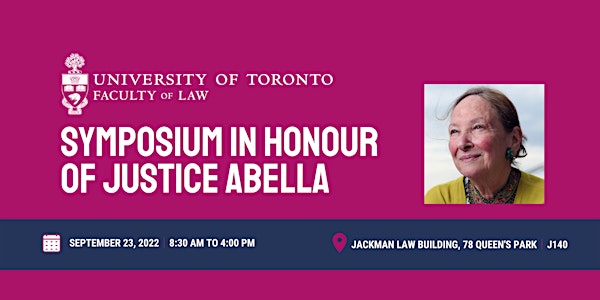
Symposium in Honour of Justice Abella
On Friday, September 23, 2022, the Faculty of Law will be hosting a symposium in honour of retired Supreme Court Justice Rosalie Abella.
Date and time
Location
University of Toronto Faculty of Law, Jackman Law Building
78 Queens Park Toronto, ON M5S 2C5 CanadaAbout this event
Justice Abella retired from the Supreme Court of Canada in July of last year, and the Faculty of Law is organizing a symposium to celebrate the many contributions she has made to Canadian law and civic life. The symposium will be organized around three scholarly papers in areas of law in which Justice Abella has been particularly active: labour law, equality rights law, and public / administrative law.
The three papers will be given by:
- Professor Adelle Blackett from McGill University;
- Professor Martha Minow from Harvard Law School;
- And, Professor Paul Daly from University of Ottawa.
Their papers will address some broad themes or issues of interest in these areas. Each paper will also feature two invited commentators, who will discuss the issues in relation to Justice Abella’s own work. The invited commentators are:
- Professor Sabine Tsuruda from Queen's Law;
- Senior Fellow Elizabeth Shilton from Queen's Law;
- Professor Supriya Routh from the University of Victoria;
- Professor Claire Mumme from the University of Windsor;
- Professor Matthew Lewans from the University of Alberta;
- And, Professor Geneviève Cartier from the University of Sherbooke.
Schedule
• 8:30am - 9:00am Coffee + Registration
• 9:00am - 10:30am Martha Minow (Equality)
o Commentary from: Sabine Tsuruda & Elizabeth Shilton
• 10:30am - 10:45am Coffee Break
• 10:45am - 12:15pm Adelle Blackett (Labour)
o Commentary from: Supriya Routh & Claire Mumme
• 12:15pm - 1:15pm Lunch
• 1:15pm - 2:45pm Paul Daly (Administrative)
o Commentary from: Matthew Lewans & Geneviève Cartier
• 3:00pm - 4:00pm Reception (location/details TBD)
Papers/Presenters
Adelle Blackett
Title: Labour Law as Substantive Equality
Abstract: Thanks in large measure to Justice Abella’s jurisprudence, Canadian labour law is infused with substantive equality principles. It has not, however, escaped critical impasses that emerge in the attempt to reconcile human rights and labour law principles and procedures. This paper explores two responses proffered in Supreme Court case law. It offers a third: an act of memory. Drawing on the legal history of racial segregation and its role in the construction of the core labour law framework through which the relationship between the ‘individual’ and the ‘collectivity’ in Canada and the United States, it nudges Canadian labour law beyond the ‘choice’ and toward a fulsome embrace of substantive equality’s transformative potential.
Paul Daly
Title: The Autonomy of Administration
Abstract: Justice Abella is closely associated with deference to administrative decision-makers. I will argue that her deferential approach was multi-faceted, much more sophisticated – and, indeed, jurisprudentially controversial – than is typically assumed. Justice Abella’s administrative law jurisprudence is more about administrative autonomy than it is about judicial deference, is based on her profound trust in public administration and was sometimes tempered by her inherent progressivism. But this constellation of features could well lead to the very type of ‘deference as submission’ against which Justice Abella consistently railed.
Martha Minow
Title: Equality AND Equity
Abstract: In the United States, the terms “equality” and “equity” have become weapons in polarized political arguments rather than analytic tools. The political volley over words neglects and obscures decades of litigation, policy, and academic work including pioneering writing and thinking by Justice Rosalie Abella. Conceptions of equality and equal treatment can move well beyond simplistic plans to treat everyone alike regardless of historic and current differences and experiences. The hard work calls for a conception associated at times with equality and at times with equity of laws and policies that are responsive to individual and structural differences in people’s circumstances and for navigating truly individualized consideration and approaches attentive to group membership or social structures. Doing so should honor individual choice while staying mindful of systemic patterns.